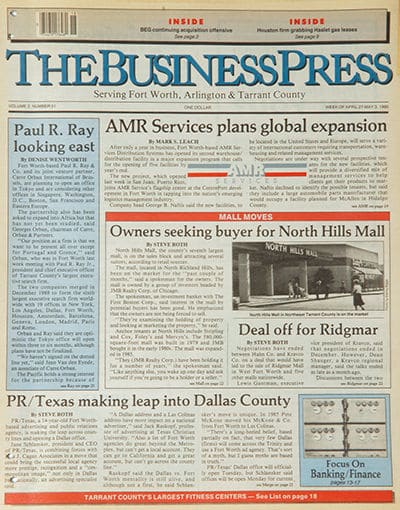News, news and more news
No matter the format
When the Fort Worth Business Press began, in 1988, I paid little mind. I had just gotten a job in magazines and back then there was quite a gulf between newspapers and magazines. I had moved on from newspapers, out of the slum of daily ink on cheap newsprint to the rarified atmosphere of the magazine world: quality graphics, heavy, hip layout, slick paper. Our nose slightly in the air, we were cut from a different, more expensive, cloth. We didn’t just report news, we “analyzed” news. I mean, I was nearly 30 years old – surely I knew all there was to know. In the magazine world we had six hour meetings to discuss the magazine’s cover. It was brutal.
Less than 15 years later and the world was a different place, for me and for journalism. And maybe I didn’t know quite as much as I thought I did at 30.
Still, for me, the magazine world was quite nice. There was more travel, nicer hotels, more time to call sources, more freedom to tell stories graphically. Oh yeah, more money.
But frankly, I missed breaking news, always my specialty. No one tells you “Great scoop,” in the magazine world. “Boffo analysis piece on the tanking stock price of XYZ Corp. Jolly good. It’s 5 o’clock somewhere, let’s doff some martinis,” was more like it. Nice, but it was missing something. Like a longtime sports fan who needs gambling to keep it interesting, I – and my attention-deficit disordered mind – needed something with a little more juice. And I didn’t need any more six hour meetings on the cover.
So I was hired by a weekly publication that was just starting to dip its technological toes into something called the information superhighway, or the internet, or something. It might need a reporter who could come up with scoops. I delivered scoops. I once got a scoop that so good the editor didn’t believe it was real, so he buried it. Two weeks later, another editor realized it was a real, bona fide scoop and put the same story on the cover.
At InfoWorld, I got my first glimpse of what the internet could do. A scoop could go worldwide. Not in days, weeks or years, but in seconds. Now that changed things.
At the same time, the journalism business was changing, too. And not for the better. Layoffs were beginning and eventually the Fickle Finger of Fate pointed its icy downsizing digit in
my direction.
I’ve recounted my route to the Fort Worth Business Press before, but suffice it to say, I wanted to cover stories close to home and the Business Press fit the bill, being just a few miles from my home.
It let me stay in the game, even as the game changed. Kept it interesting.
“The traditional newspapers are having a lot of trouble and will continue to because of a change in the way people want to receive news,” says Dr. Charles Howard, associate professor of journalism at Tarleton State University. “Now reporters have to provide the news in a cross-platform format,” he said. “They take a story – and using the same reporting and writing skills – now deliver it in print, online, via video or in a podcast format. They have to operate in all of those areas.”
That’s certainly true for the Fort Worth Business Press. When I started in 2003, we had a weekly print publication, several special publications and we updated the website once a week.
Now, 15 years later, we have two well-read daily digital publications, a Sunday digital edition, a couple of weekly digital newsletters, our weekly print publication and several special edition magazines as well. And we’re on social media with 10,700 Twitter followers. That number still surprises me. Just recently we had a meme that went viral. If I had typed those words when I started at the Business Press, they would have carted me off.
Howard believes that readers now find their breaking news on a variety of platforms and they’re not going to wait for a morning paper
to land on their front porch.
The publications that can find ways “to get readers to move from a media platform like Twitter and then begin to consume content in a lengthier format will prove to be very successful,” he says.
People want news, Howard notes, and they’re consuming it more than ever.
That’s true here after 30 years, and I think we’ll be here in the next 30 years even as the walls separating magazines, newspapers, online and social media are dissolving as we speak. And you, our readers, keep us busy by providing news and ideas for news every day.
But key to our success is that you keep reading. Just this week, someone came up to our office to get copies of a newspaper from six weeks ago. The boss of a local company wanted to make sure all the members of the company’s board of directors read the paper. Really, except for the fact that I need to pay my bills, that was as good as a paycheck.
As long as you’re reading, we’ll be here.






